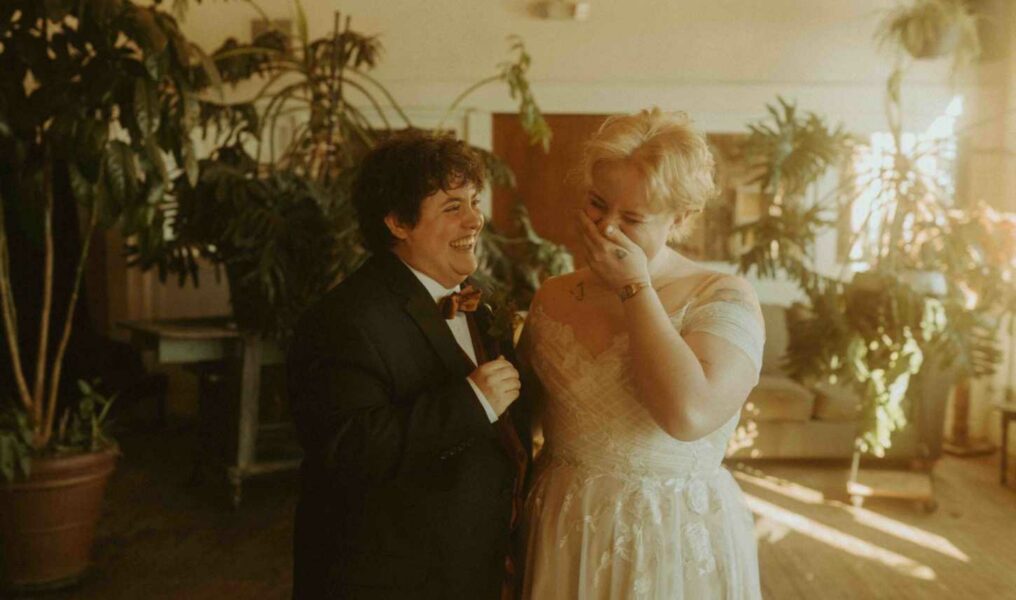Before You Say ‘I Do': Tips for Finding the Best Wedding Officiant for Your Special Day

Finding the right officiant for your wedding, one who understands and respects your beliefs and traditions can be difficult — even more so for queer couples. Whether it’s a religious leader, a family member or a close friend, it’s essential to make sure everyone is on the same page: Is it going to be a quick and easy wedding, or a more traditional affair? The officiant sets the tone for the ceremony, so it’s important you feel comfortable and respected. It’s essential that the officiant respects and supports the relationship and can be trusted to use the right language — including pronouns. Keep these four considerations in mind when choosing your officiant:Consider choosing someone from the LGBTQ+ communityChoosing someone from the LGBTQ+ community can be key to ensuring that the ceremony is a judgment-free zone and that the officiant truly understands that love can be shared among people of any gender identity or sexuality. They should understand the considerations that a couple may need to make and be prepared to deal with less than understanding friends and family. Mercedes Allenbaugh, 27, from Ypsilanti, said she would prefer an officiant who is a member of the LGBTQ+ community. “Doesn’t matter sex or gender identity, as long as they love love as much as us,” she said. Still, finding an LGBTQ+ officiant can prove to be a challenge, especially when most websites for wedding officiants don’t advertise to queer couples and are flooded with heteronormative imagery. For many couples, this can be off-putting, and they seek officiants who are open and inviting to LGBTQ+ couples. Wynn Roney, a 23-year-old from Macomb, struggled with this. They said, “I tried looking online for an inclusive minister for a while but had a lot of trouble finding one in our area. There aren't many out there that advertise to couples like us.” Ro FitzCrane, 25, from Ypsilanti, also emphasizes the need for an officiant’s acceptance to be loud and clear. “It would need to be advertised on their website that they are accepting of all marriages and supportive of the LGBTQ+ community,” FitzCrane said. For queer couples, many of whom deal with microaggressions on a daily basis, having their wedding be as comfortable as possible is essential. Having a queer or allied officiant, one who isn’t ashamed of celebrating the love between LGBTQ+ couples, helps put them at ease.Will the officiant’s process vibe with your couple needs?Different officiants have different ways in which they prepare for the ceremony. Some have a more set script, while others work with the couple to plan the ceremony. Some only meet the couple once, while others have regular sessions to understand the couple and even offer marriage counseling. For many queer couples, officiants who refuse to deviate from a pre-written script may not be the right fit. Stacey Swickerath, a queer, ordained officiant from Chelsea, believes that planning a ceremony has to be a completely collaborative process with the couple. “On my website I have a list of questions to help couples share their story with me,” she said. “I ask things like how they met, what they appreciate about each other, and what they'd like to share with friends and family about their relationship — or not.” By giving couples the option of either writing out and sending responses or setting up a video call to talk, Swickerath believes that they can choose to go with either a more thought-out or spontaneous approach, both of which have their benefits. “We gave feedback to our officiant on the script before our ceremony so we were certain it’s what we wanted,” shared Grand Rapids-based Janelle LeBlanc, a 29-year-old who got married in October 2021. “She crafted a really beautiful questionnaire for us to complete, before she wrote the script, with logistical questions and personal reflection questions for us.” LeBlanc believes that it was a special moment in their engagement to have this beautiful conversation about what they are most proud of in their relationship and what they loved most about one another. The officiant used the responses for the ceremony, adding a personal touch that would have been missing in a generic script. Having pre-wedding meetings with the officiant can also ensure that they use the correct language and make time for what is important to the couple. LeBlanc, for example, incorporated a moment of silence dedicated to the queer elders who came before them and to acknowledge that true marriage equality doesn’t exist in the U.S.Ensure that the officiant knows your pronouns“Language was very important for us. My wife did not want the wording of ‘bride’ to be used to describe her, so we wanted to remove gendered traditional language,” LeBlanc said. This is a concern for many queer couples, who often fear being misgendered in their wedding ceremonies and falling trap to the heteronormative language they are trying to avoid. Roney, who got married in February 2022, said it was difficult finding someone who would adhere to the language they wanted as someone who presents outside the binary. This left them worried about inadvertent homophobia. “I was very afraid they would mess up and say the wrong pronouns, which I really didn't want for my own wedding,” they added. Keeping this concern in mind, Swickerath takes input from the couple on the language, too. “I offer some sample text to start with, and then provide as much customization as they want. That includes preferences on whether they'd like to be referred to as married partners, husbands or wives, or any other terms that fit the individuals.”Consider choosing a family memberMany couples choose to ask an ordained friend or family member to conduct the ceremony. It adds a level of ease, and they are assured that the officiant knows the couple well and speaks from a place of love. For those who are not looking for a very religious wedding, this can be a great solution. It can be useful to choose someone who knows both people well and who is a good public speaker. Roney, for instance, ended up picking their brother to officiate the wedding in part because it was too difficult to find someone who fit their criteria perfectly. “We're not religious people, so we didn't want to have a minister, and we weren't comfortable with the idea of hiring a stranger who didn't know the two of us very well,” they said. At the end of the day, a wedding is something couples remember in the years to come. Looking back on it, there shouldn’t be the feeling of regret about choosing the wrong officiant or “what ifs” about whether it would have been better to pick a friend. So it's essential to plan and prepare a list of non-negotiables to go over when interviewing different officiants and then making an informed decision. After all, an officiant’s words may just make or break a wedding.









